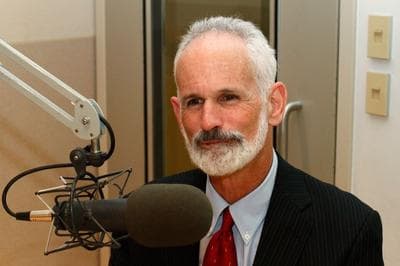Advertisement
Controversial Former Beth Israel CEO Writes About Lessons Learned The Hard Way

For nearly a decade, Paul Levy was perhaps the best-known hospital chief in Boston. He wrote a widely read blog and had had previous high-profile jobs in which he turned around troubled agencies. So his fall from grace was particularly startling.
Levy stepped down last year as the CEO of Beth Israel Deaconess Medical Center amid a controversy over his personal relationship with a female subordinate. Levy has now self-published a book about management and leadership, "Goal Play: Leadership Lessons from the Soccer Field." One of its chapters is titled "I'm Sorry," and in it he writes this:
As you read this story, you are probably wondering how I could have been so foolish as to have misjudged the situation that caused all this strife. It turns out that this is a common disease of CEOs and other leaders. When you are engaged in doing your job, and you know you are doing it well, you tend to rationalize away things that should be warning signs — things that you would immediately notice as poor judgment if some other leader were doing them.
WBUR's All Things Considered host Sacha Pfeiffer spoke with Paul Levy Friday and asked him why he thinks he became a victim of what he calls that "disease."
Paul Levy: When you’re in charge of an organization, whether it's a hospital or a corporation or the United States government, you have people around you who tend to agree with you a lot and tend not to raise issues that are uncomfortable for you, either out of loyalty or perhaps sometimes out of fear that you'll get angry at them or whatever.
Sacha Pfeiffer: This makes me think of something I read recently in the Wall Street Journal — it made enough of an impact on me that I scribbled it in my notebook. It says: "Great CEOs don't just surround themselves with consultants and advance men. They also hire contrarians, alter egos and at least someone who isn't afraid to poke a finger in their chest." Do you think at Beth Israel you had enough people willing to poke fingers in your chest?
Actually, yes. I mean, I've had a practice over the years to hire people who would question all the time. And they did on substantive matters, on business matters, on clinical matters and all the rest. But I think in this particular case, because they viewed it as a personal issue, that they felt uncomfortable or felt that it wasn't appropriate.
On the other hand, one of the things that was much talked about in the coverage of this was that even though you may say it was a personal relationship that didn't affect work, there was the issue of a nonprofit hospital with nonprofit dollars paying the salary of a woman, and later a severance to a woman, who had a romantic relationship with the CEO, and later paid a severance to the CEO. So, in that sense, it did become substantive; it became financial for the hospital.
Well, first of all, your characterization of a romantic relationship has never been stated by me or anybody else involved in this. She was a close personal friend. And any other details concerning that relationship have not been discussed and I view them as private.
Can I assume this is a forum where you don't want to acknowledge either way whether it was romantic?
I would just say to you that that's a private matter. The mistake I made was that hiring someone with whom you have a close personal relationship can create an impression in the organization of favoritism or whatever, and that's a bad thing to do for that reason alone.
As I'm sure you know, there are some people out there who feel like you lost the ability to write a book about leadership and management because of this failure in leadership in this incident when you were at Beth Israel. How much credibility do you think you still have as someone who can talk about leadership and management?
Well, if you lose the ability to talk about leadership because you make a mistake, even a big mistake, then there aren’t going to be many people who can talk about leadership. I think the sign of any good leader — or, for that matter, any person — who wants to improve is you acknowledge your mistakes and you see if there are lessons to be drawn from them and, in the case of this book, perhaps teach other people from that experience and go on.
What do you think are the biggest lessons you learned from this as a manager?
You can't be a good judge of how people regard you in the organization when you’re in a position of authority. It's that very position of authority that biases people's interactions with you. So you need to have some kind of independent assessment of your performance to protect you from yourself.
If that had been done in your case, what do you think the result of that review would have been?
Well, I think six or seven years earlier, somebody would have said, ‘This relationship is creating problems in the organization in terms of perception and you should do something about that.”
If you had to do it over, would you hire this woman into this job?
No.
Do you hope to be employed again one day by any company or hospital?
It's too soon to tell. I don't really want to run another hospital. Maybe the right organization will come along. I tend to like to run places that are in trouble. And if the right thing comes along, I might do that.
This program aired on February 17, 2012.
